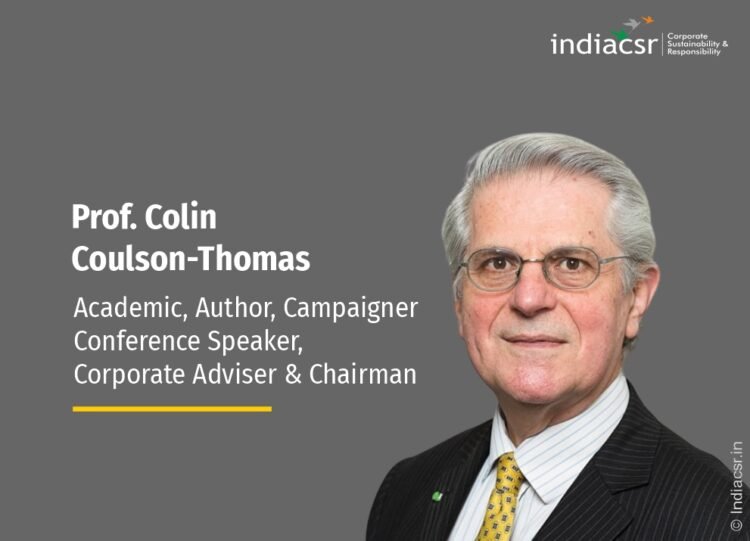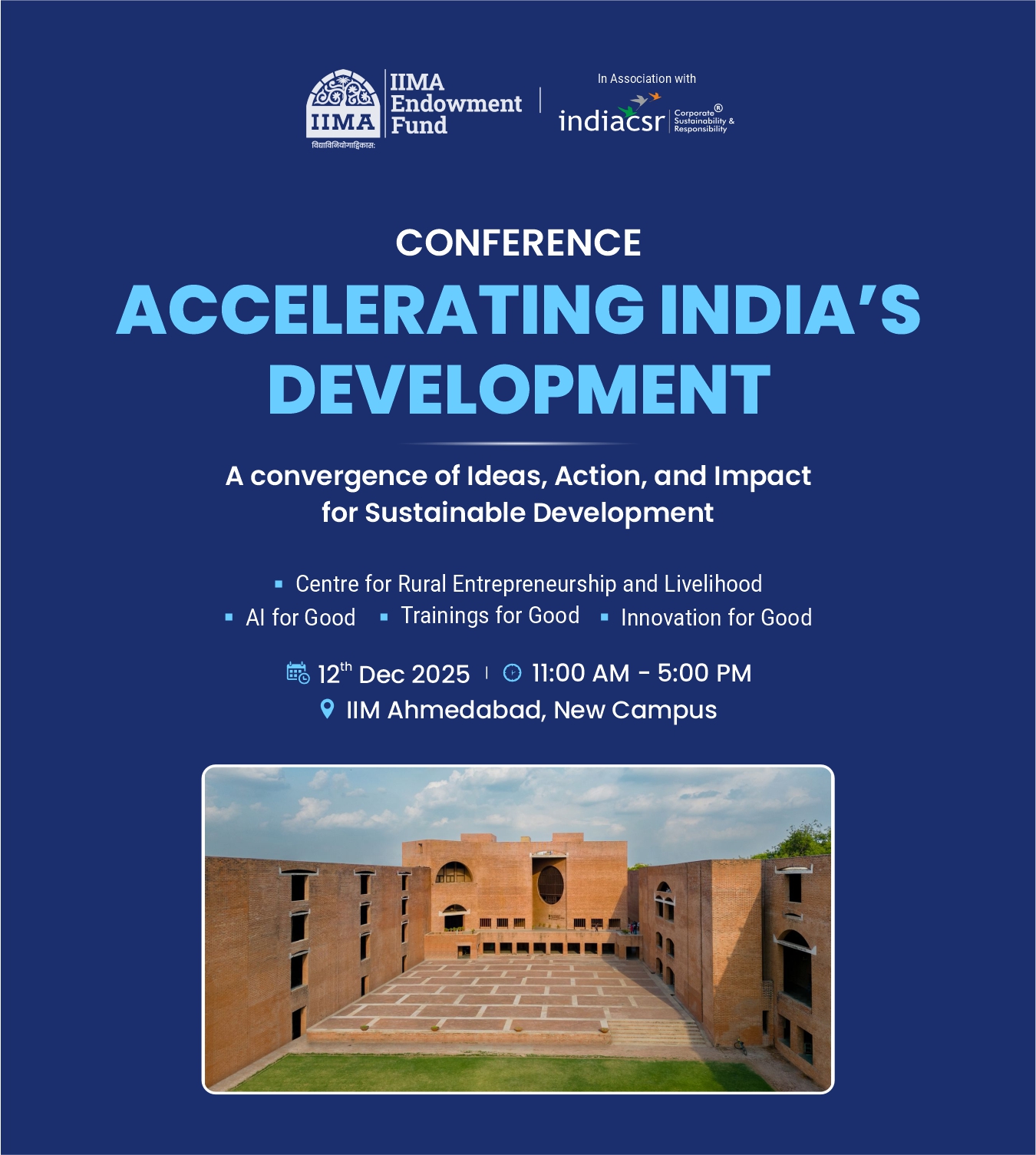The article is based on a talked delivered by Prof (Dr) Colin Coulson-Thomas at India ESG Summit organised by India CSR in Mumbai on May 31, 2022
By Prof (Dr) Colin Coulson-Thomas
Our futures and those of many other life forms are not assured. Unsustainable growth, lifestyles and business activities are damaging the environment, reducing biodiversity, depleting natural capital and contributing to global warming and climate change.
We need to recognise that we are the cause of our own problems. Individuals, organisations and communities, like the Governments that encourage and incentivise economic growth, want the benefits of development and consumerism, but without their negative consequences. We want to have our cake and eat it.
The undesirable impacts of human behaviours upon the environment and their social consequences have reached potentially catastrophic levels. An international scientific consensus suggests our damaging activities urgently need to be addressed.
Transition and transformation journeys to more sustainable operations and lifestyles must be accelerated while they are still possible. We must act before tipping points are reached after which an existential challenge such as global warming becomes unstoppable.
What can and should we now do in relation to our own behaviours and lifestyles and those of the people with whom we work, learn and live? Could we better engage, influence and support those to whom we report or feel accountable and help them to change direction?
Also Read: Interview on strategic CSR with Prof (Dr.) Colin Coulson-Thomas
We cannot assume continuing corporate relevance, acceptability and success.
We must help colleagues to be aware of the consequences of corporate activities, alert to developments in the business environment affecting them, and sensitive to changing stakeholder views about them.
Some ESG motivations are externally driven. They reflect legal and regulatory requirements, pressures from stakeholders and wider public aspirations, expectations and requirements.
Increasingly, they also need to be inwardly driven. Rather than just react, we want boards to be more responsible and to actively address challenges such as climate change. Corporate activities need to be more sustainable and to have beneficial rather than harmful impacts.
More stakeholders are devoting attention to ESG issues. There is growing recognition of the reputational, financial and relationship benefits of responsible leadership.
The need for greater environmental and social responsibility and more responsible governance is clear. This is where you can be especially helpful.
Most, if not all, matters before a board, from corporate purpose, objectives and priorities to corporate activities and their impacts, should now be viewed through an ESG lens.
Also Read: Future Boards, Sustainability and Climate Change: Prof Colin Coulson-Thomas
We need to confront contextual challenges
Strategic direction and corporate policies should encompass a widening circle of arenas previously considered as ‘external’, such as the environment.
It is becoming ever more difficult to just focus on ‘business’ matters and avoid ‘political’ issues. Investors with ESG priorities and stakeholders in general seem increasingly concerned with the broader economic, social and environmental impacts of corporate activities.
Many Indian boards face particular challenges in relation to international operations. Should they establish corporate foreign policies as well as those relating to net zero and UN SDGs?
Global warming with its climate change consequences and the Russian invasion of Ukraine with its risk of escalation are pressing international and existential challenges. In relation to global warming, past emissions of greenhouse gasses are history. Whether or not tipping points are triggered will depend upon what we do now and future emissions.
Other countries are aiming to achieve ‘net zero’ by 2050 and in some cases earlier. India plans to be a net emitter of greenhouse gasses for long after. Given the potential catastrophic impacts of uncontrollable temperature rises and related losses and damages claims, should Indian boards be more ambitious in their corporate net zero targets?
The premeditated and illegal invasion of Ukraine in violation of the UN charter has caused many countries around the world to impose sanctions upon Russia. The UN Secretary-General has said that “Ukraine needs and deserves our full commitment and full support”.
Whether because of corporate values, ethical principles or the reputational damage that might arise in many markets from not backing or applying sanctions, should more Indian boards follow the example of companies like Tata Steel and Infosys and stop working in the Russian Federation and/or withdraw from the country?
Also Read: Prof Colin Coulson-Thomas named ‘India CSR Goodwill Ambassador for Sustainability’
We need to grasp opportunities that accompany our challenges
Corporate purpose, vision, values, goals and objectives must be sustainable, aligned and consistent with the strategies, policies and behaviours to achieve them. Activities in support of laudable objectives must not lead to undesirable consequences and negative externalities.
Environmental and social goals and objectives should be ambitious and even stretching, but they must also be affordable and attainable.
Boards must achieve a balance between measuring, monitoring and reporting on what they set out to do, and being open, receptive and flexible in relation to new opportunities and pressures for more responsible conduct.
Addressing many of the challenges facing us and seizing related opportunities requires collective effort. What a company does in collaboration with other entities may be as important as its own solo activities.
Effective boards recognise the potential for corporate and stakeholder engagement and alignment around shared interests. They understand both the inter-connectedness of different existential challenges and the opportunities they create.
Board and corporate discretion to act must be used.
Corporate constitutions often give directors wide discretion in terms of the activities a company can undertake. Contributing to collective activities to confront shared challenges and seize related opportunities could be a corporate purpose.
While Governments sometimes act quickly in crisis situations, the greater freedom of action of corporate boards can often be more conducive of diversity, flexibility and creativity.
Companies can often offer alternatives, choice and bespoke responses. They can try different approaches to suit local requirements.
Directors can play a vital role as instigators, enablers and supporters of exploration, innovation and entrepreneurship. These activities are crucial for addressing existential challenges and transitioning to more sustainable operations and lifestyles.
Also Read: Prof (Dr) Colin Coulson-Thomas
We need more collaboration and collective action
Coalitions or consortia of organisations may have to be brought together to address common requirements, such as those for climate change adaptation and more resilient infrastructures
Greater awareness of aspirations and priorities might allow conversations to be switched from price to value creation and consequences.
Corporate governance should enable rather than constrict. It must be appropriate for a company’s purpose, stage of development, challenges and opportunities. It may also need to embrace supply chain and other stakeholder relationships and collaborative agreements. The bulk of negative externalities may be largely hidden within corporate supply chains.
Governance should also recognise and accommodate diversity. Some business units, collaborations, ventures or projects may need to be governed or managed differently on account of the nature of their activities, the timescales required and parties involved.
We must be more open and transparent
Corporate accounting and reporting policies and practices often reveal the extent to which a board is aware, responsible and transparent. Those of many companies seem designed to conceal the full extent of negative externalities.
Activities that damage ecosystems, reduce bio-diversity, deplete scarce natural capital and contribute to global warming are sometimes hidden or tolerated. They may also be described and reported as ‘profitable’.
Directors who do not challenge such practices are morally responsible. In time they may become legally liable for consequential harm to the environment and current and future generations.
Rather than hide past excesses, irresponsible activities, and mistakes, boards should encourage executives, and customers whose demands contributed to them, to move on and learn from them. They should seek to understand the drivers and root causes of operations and proposals that appear irresponsible or prove to be harmful so that they can be addressed.
Also Read: India CSR Honours Prof. Colin Coulson-Thomas honored with India CSR Lifetime Achievement Award
ESG should be recognised as an opportunity
ESG and responsible business is more than scaling back damaging activities, unsustainable operations and negative consequences. They should involve initiatives to create, enable and support operations and lifestyles that are desirable and sustainable.
ESG is about opportunity and responsible innovation, enterprise and capitalism. It is about creating new options and choices for stakeholders to live and operate more sustainably and in harmony with the natural world as advocated by Indian ancient wisdom.
It could involve regeneration and rewilding, social and economic inclusion, climate justice and lifestyle transformation.
ESG can engage and may excite, but it also often requires passion and courage to achieve. More directors may need to become educators, advocates and ambassadors. They may have to act more explicitly as a corporate conscience.
Creating more responsible, inclusive and sustainable corporate futures and lifestyles may require significant, if not radical, changes of priorities. Focus may need to switch from activities to the outcomes that concerned stakeholders increasingly seek and require.
Maybe the feelings and fulfilment that customers seek from manufactured offerings could be more reliably delivered by less environmentally damaging and resource intensive alternatives such as a garden centre, recycling team or life coach.
We should help people to do things differently, make more responsible choices and adopt simpler, healthier, less stressful and wasteful, and more rewarding and sustainable lifestyles.
Finally we must act while there is still time
Our future and that of many ecosystems remain in the balance. Shared existential challenges and experiences create a rare opportunity to unify around the common goal of survival.
Sadly, the invasion of Ukraine has exacerbated fault lines and opened up new ones, at a time when we need collaboration and collective action to deal with shared existential challenges.
Liberal-illiberal, democratic-authoritarian, free and controlled media, inter-community, and other divides might be exacerbated by mass migrations caused by climate change.
You are at this summit because you care. You think about consequences. You favour responsible conduct and you want to improve ESG outcomes.
Strategies for creating sustainable corporate futures are urgently required. They have to be formulated and implemented. You have never been more needed.
You could make the difference between catastrophe and survival. You have a purpose, a cause and an unprecedented opportunity. Go for it.
Also Read: Integrating Sustainability as a Board Strategy: Prof (Dr) Colin Coulson-Thomas
About the Author
Prof (Dr) Colin Coulson-Thomas
Prof (Dr) Colin Coulson-Thomas, President of the Institute of Management Services and leader of the International Governance Initiative of the Order of St Lazarus, has a portfolio of international leadership roles and is inter alia India CSR’s global Goodwill Ambassador for Sustainability and Director-General, UK & Europe operations of India’s Institute of Directors. He has helped board members to improve director, board and corporate performance in over 40 countries.





